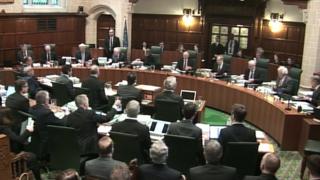
The Supreme Court held a four-day hearing over the UK government’s right to trigger Brexit
AMs do not have to be legally consulted on the article 50 Brexit process, the Supreme Court has ruled.
On Tuesday morning senior judges ruled that the UK government cannot trigger Brexit without consulting MPs.
But in the same ruling the Supreme Court dismissed an argument from the Welsh Government that the assembly should be consulted on the mechanism to leave the EU.
A senior Welsh minister had argued the process needed a vote in the assembly.
The Welsh Government had told the court that if the sovereignty of Parliament was not upheld, and MPs did not vote on article 50, it would undermine the basis for devolution.
It had also argued that using royal prerogative powers to trigger article 50 short-circuited the Sewel Convention, which requires AMs to vote on legislation which affects the Welsh devolution settlement.
Wales’ top legal advisor, Counsel General Mick Antoniw, said that starting this process in that way would “modify the competence of the National Assembly for Wales and the Welsh Government”.
The UK government dismissed that argument as “tortuous”, and the court on Tuesday unanimously concluded that the convention does not “give rise to a legally enforceable obligation”
The judgement said that the convention is a political constraint on the activity of the UK parliament, but that the policing of its scope and operation is not within the constitutional remit of the courts.
Judges concluded the devolved legislatures in Wales, Scotland and Northern Ireland do not have a veto on the UK’s decision to withdraw from the EU.
In December, the UK government appealed against a High Court ruling that Parliament must approve the Article 50 process of leaving the EU.
However a majority of the judges also dismissed the UK government’s case that the prime minister could invoke Article 50 of the Lisbon Treaty to launch the formal two-year process of leaving the European Union using crown prerogative – powers used by ministers that do not require the permission of MPs.
The UK government had stressed the “conduct of foreign relations”, including those with the EU, were not devolved to Wales, Scotland or Northern Ireland.
Mick Antoniw said the voice of Wales in the UK constitution is priceless
Hywel Williams, Plaid Cymru MP, said he was very disappointed: “Clearly the needs of the people of Wales and the Welsh economy are different from the needs of the economy in central London.”
“I think we should be properly consulted,” he argued.
Speaking to BBC Wales on Tuesday morning, Mr Antoniw defended the £84,000 cost of the challenge, saying: “The voice of Wales within the UK constitution is priceless.”
At the time of the appeal, Welsh Secretary Alun Cairns said he hoped the Welsh Government was not getting involved in the Supreme Court appeal as a means of trying to block Brexit.
He pointed out that a majority of people in Wales, and across the UK, had voted in favour of leaving the European Union.
Mr Antoniw has denied attempting to block Brexit, saying the Welsh Government’s aim was to support the sovereignty of Parliament.
Article 50 case: AMs ‘do not have to be legally consulted’}

